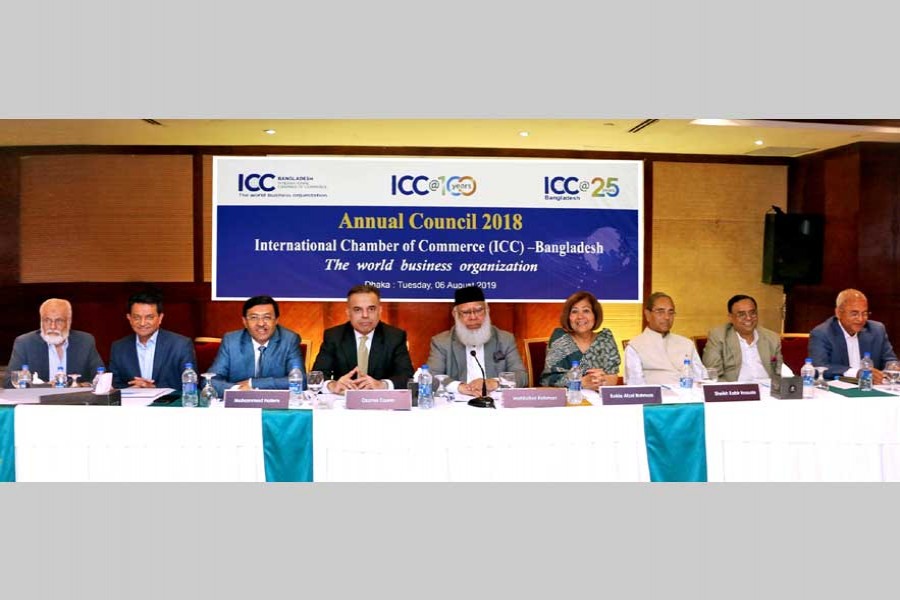Two big challenges stand in way of BD’s development: ICCB President
ICCB 24th Annual Council held

Published :
Updated :

There are two big challenges in the way of Bangladesh’s development. The main one is to maintain the economic growth continuously. Another challenge is related to eradicating inequality. If the country continues its economic growth, it has to ensure the equal distribution of the benefits of the growth among all. That means the government has to give more importance on social service delivery like health service, education service etc., said ICC Bangladesh President Mahbubur Rahman while presenting the Executive Board Report at the ICC Bangladesh Annual Council held in Dhaka on Tuesday.
Lack of Regulatory Predictability Businesses faces regulatory uncertainty on various fronts. Regulatory predictability matters because it makes property rights insecure, thereby constraining investment. This leads to uncertainty for businesses – medium-size firms seem to bear the brunt more than large or small firms – and with inconsistencies in policy implementation, it can adversely affect employment growth. Bangladesh’s regulatory system needs the establishment of a technical regulatory oversight body at the center of government to oversee, lead and report on regulatory reforms, mentioned ICCB President Mahbubur Rahman.
Attaining the target depends on how quickly Bangladesh can resolve the challenges experts suggests that foreign and local investments be increased and the activities of Economic Zones should start immediately, Mahbubur Rahman observed.
In order to become an upper middle-income country by 2031 and achieve high-income country status by 2041, Bangladesh will require huge investments in physical capital, human capital, and innovation enabled by reforms in areas such as financial sector, business regulation, and to address the infrastructure gap, the Council Report added.
In the development update, the World Bank has noted that private sector investments in Bangladesh remain weak. Initiatives are needed to address several challenges, particularly in boosting private sector investment and diversifying exports. In the development update, the WB expressed concern over the rise of non-performing loans (NPLs). Directed lending, poor risk management, and weak corporate governance lead to the rise in NPLs. The practice of loan rescheduling and write-offs also increased, creating further stress on banks, mentioned ICCB President Mahbubur Rahman.
To bring stability and discipline to the financial sector, Bangladesh has to ensure Bangladesh Bank’s autonomy on regulation, integrate risk-based supervision in the central bank’s supervisory framework, tighten rescheduling guidelines and stop ad-hoc rescheduling, said Mahbubur Rahman.
The Council adopted the Executive Board Report & Audited Financial Statements of ICC Bangladesh for the year 2018.
Among others, ICCB Vice President Rokia A. Rahman; DCCI President Osama Taseer; Bangladesh Insurance Association President Sheikh Kabir Hossain; BKMEA former 1st Vice President Mohammad Hatem; FICCI Vice President Francois de Maricourt; ICCB Board Members : Aftab ul Islam; A. K Azad; Tapan Chowdhury; Anwar-Ul-Alam Chowdhury (Parvez); Kutubuddin Ahmed; Md. Fazlul Hoque; ICCB Members : Anis A. Khan, Managing Director & CEO, Mutual Trust Bank Ltd.; Rahel Ahmed, Managing Director & CEO, Prime Bank Ltd.; Subrata Biswas, CEO, State Bank of India; Ahmed Shaheen, DMD, Eastern Bank Ltd.; Mominul Islam, CEO, IPDC Finance Limited; Md. Khalilur Rahman, Managing Director, National Housing Finance & Investments Limited; Syed Ershad Ahmed, Country Manager & Managing Director, Expeditors (Bd.) Ltd.; Mahbub Jamil, Chairman, ICE Technologies Ltd.; Parveen Mahmud FCA, Shasha Denims Ltd.; M.A. Jabbar, Managing, DBL Ceramics Ltd.; Rashed Maksud Khan, Chairman, Bengal Fine Ceramics Ltd.; Abul Kasem Khan, Managing Director A.K. Khan Telecom Ltd.; Jowher Rizvi, Managing Director, Summit Alliance Port Ltd.; Khurshid Irfan Chowdhury, Managing Director & CEO, Transcom Beverages Ltd.; Mohammad Shahjahan Khan, Managing Director, S. S.Shipping&Trading Ltd.; Mohammad Fazlul Azim, Managing Director, Azim Group; Mr. Mohd. Arshad Ali, Managing Director, The Merchants Limited; Abu Alam Chowdhury, Managing Director, CONEXPO Ltd.; Md. Nurul Haq Majumder, CEO, Financial Excellence Limited; Rizwan-Ur Rahman, Managing Director & CEO, ETBL Securities & Exchange Ltd.; Muhammad A. (Rumee) Ali, CEO, Bangladesh International Arbitration Centre (BIAC) & ICCB Secretary General Ataur Rahman attended the Council Meeting.


 For all latest news, follow The Financial Express Google News channel.
For all latest news, follow The Financial Express Google News channel.